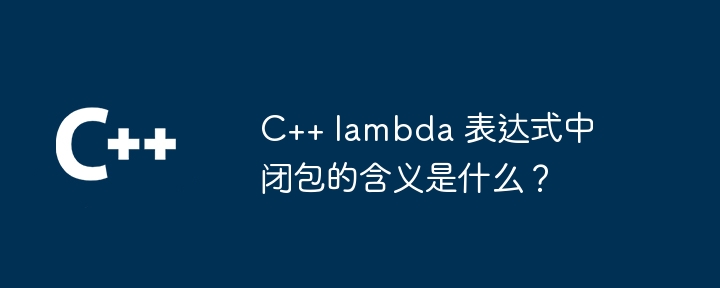
In C, a closure is a lambda expression that can access external variables. To create a closure, capture the outer variable in the lambda expression. Closures provide advantages such as reusability, information hiding, and delayed evaluation. They are useful in real-world situations such as event handlers, where the closure can still access the outer variables even if they are destroyed.

C Closures in Lambda expressions
In C, a closure refers to one that has access to its declaration scope. lambda expression for external variables. In other words, a closure is a function that contains a snapshot of a specific variable.
How to create a closure
To create a closure, use a lambda expression and capture the surrounding variable to be accessed.
int outerVar = 10;
auto lambda = [outerVar](int x) { return x + outerVar; };In the above example, the lambda expression captures the variable outerVar. This means that even if lambda leaves its declaration scope, it can still access the value of outerVar.
Advantages of closures
Closures provide the following advantages:
Practical case: event handler
In GUI programming, closures are often used to implement event handlers. For example, the following lambda expression creates a click event handler that prints the captured button ID:
QPushButton* button = new QPushButton("Button");
button->clicked.connect([id = button->objectName()](bool) {
qDebug() << "Clicked button: " << id;
}); Even after button is destroyed, the closure can still access it ID because captured variables are always stored in closures.
Conclusion
Closures in lambda expressions are powerful tools in C that allow a function to access variables outside its declaration scope. They provide advantages such as reusability, information hiding, and lazy evaluation. By understanding the concept of closures, developers can create C code that is more flexible, powerful, and maintainable.
The above is the detailed content of What is the meaning of closure in C++ lambda expression?. For more information, please follow other related articles on the PHP Chinese website!
 lambda expression
lambda expression
 What are the differences between c++ and c language
What are the differences between c++ and c language
 Recommended learning order for c++ and python
Recommended learning order for c++ and python
 Cost-effectiveness analysis of learning python and c++
Cost-effectiveness analysis of learning python and c++
 Is c language the same as c++?
Is c language the same as c++?
 Which is better to learn first, c language or c++?
Which is better to learn first, c language or c++?
 The difference and connection between c language and c++
The difference and connection between c language and c++
 C++ software Chinese change tutorial
C++ software Chinese change tutorial




